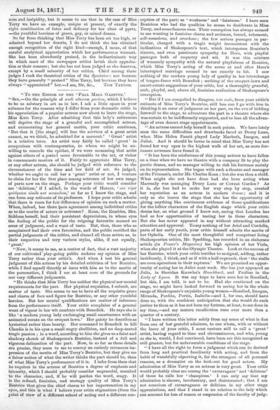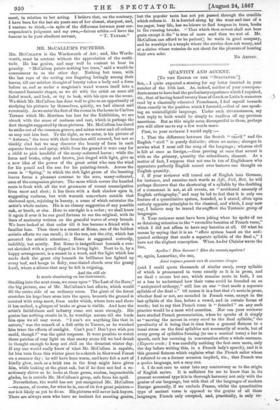" To THE EDITOR OF THE PALL MALL GAZETTE.' '
" Sin,—On the principle of audi alterarn parteni, which I believe to be as salutary in art as in law, I ask a little space in your columns for the reasons why I differ from your dramatic critic in his appreciation of a popular actress now about to leave the stage, Miss Kate Terry. After admitting that this lady's retirement will deprive the stage of a graceful and accomplished actress, and enumerating her general merits, • your critic continues, But that it [the stage] will lose the services of a great artist cannot, as we-think, be admitted for a moment." Great' artist is a relative term. An artist may fairly be called ' great' in comparison with contemporaries, to whom, we might be un- willing to concede the epithet, if we were measuring that artist against others of a period more favourable to the art, or richer in consummate masters of it. Fairly to appreciate Miss Terry, or any other actress, she should be judged with reference to the circumstances of the time and her field of art. So judged, whether we ought to call her a great' artist or not, I venture to claim for her the first"place among actresses of her own range of parts now on the stage, Perhaps your 'Critic would consider me delirious,' if. I added, in the words' of Horace, nee viget quidquam simile ant secundum,' so far as I know the stage, and can form any estimate of its professors. I hope your critic admits ;thatthere is room for fair difference of opinion on Such a matter. When, indeed, has there been agreement among individual critics as to the merits of actors or actresses ? Kean, the Kembles, Mrs. Siddona herself, had their persistent depreciators, in whose eyes the feeling of the public for the reigning favourite seemed an error of judgment, and a want of taste. But, then, those who so complained had their own favourites, and the public rectified the partial judgments of the critics, and classed all these artists as, in their respective and very various styles, alike, if not equally, great.'
"Now, it seems tome, as a matter of fact, that a vast majority of our cultivated-play-going public endorse my opinion of Miss Terry rather than your critic's. And when I test his general judgment of this actress by his detailed criticism of her Beatrice, while I find myself directly at issue with him as to the merits of the personation, I think I see at least some of the grounds for our very different judgments.
"He thinks that Miss Terry has neither the physical nor mental requirements for the part. Her physical requisites, I submit, are matter of taste. She seems to me to have all the requisite grace and charm of face and figure for Beatrice, or any other youthful heroine. But her mental qualifications are matter of inference from the performance itself. Your critic complains of a general want of vigour in her wit combats with Benedick. He says she is like ' a modern young lady exchanging small smartnesses with an animated curate on the croquet lawn' Her gaiety he describes as hysterical rather than hearty. Her command to Benedick to kill Claudio is in his eyes a small angry ebullition, and no deep-seated tragic passion ; in a word, according to him she gives us a faint and shadowy sketch of Shakespeare's Beatrice, ibstead of a full and vigorous delineation of the part. Now, in so far as these details are precise, they seem to me to convey an entirely erroneous im- pression of the merits of Miss Terry's Beatrice, but they give me a fairer notion of what the.writer thinks the part should be, than of what Miss Terry's performance of it is. I infer from them that he requires in the actress of Beatrice a degree of emphasis and intensity, which I should probably conaider ungraceful, unsuited to the character, and, if he will pardon the word, stagy. It is the refined, feminine, and unstagy quality of Miss Terry's Beatrice that gives the chief charm to her impersonation in my eyes, and this is what I believe your critic stigmatizes (from the point of view of a different school of acting and a different con-
ception of the part) as weakness' and ' faintness.' I have seen Beatrices who had the qualities he seems to desiderate in Miss Terry, and somefamous ones. Their conception has always seemed to me wanting in feminine charm and archness, forced, vehement, self-conscious, and overdone ; the few serious passages in par- ticular, charged with a tragic weight inconsistent with the indications of Shakespeare's text, which intersperses Beatrice's sincere, and even passionate sympathy for Hero, with playful passages both of coquetry and wit. It was this mixture of womanly sympathy with the natural playfulness of Beatrice, which Miss Terry's acting of the scene at and after Hero's interrupted marriage seemed to me exactly to hit. I saw nothing of the modern young lady of quality in her interchange of tongue-fence with Benedick ; nothing of the croquet-lawn and smart-curate suggestions of your critic, but a thoroughly graceful, arch, playful, and, above all, feminine realization of Shakespeare's conception.
" But if I am compelled to disagree, toto coelo, from your critic's estimate of Miss Terry's Beatrice, still less can I go with him in thinking it an error of judgment on her part, on the eve of bidding farewell to the stage, to adventure the part in a theatre where she was certain to be indifferently supported, and to lose all the advan- tage of even decent stage appointments.
" An actress cannot help herself in such points. We have lately seen the same difficulties and drawbacks faced at Drury Lane, when Miss Helen Faucit played Lady Macbeth, Imogen, and Juliet. • And it should be borne in mind that Miss Terry has not found her way open to the highest walk of her art, as more for- tunate actresses have found it.
" It has been the misfortune of this young actress to have fallen on a time when we have no theatre with a company fit to play the poetic drama, and no manager willing to risk his fortunes mainly on its representation. She began with such a theatre and manager at the Princess's, under Mr. Charles Kean ; but she was then a child. What might she not have done had she been acting when Macready was managing Drury Lane or Covent Garden ? As it is, she has had to make her way step by step, created her reputation as an actress in modern dranae ; and it is only as she leaves the stage that she has the opportunity of giving anything like continuous evidence of those qualifications for the loftier characters of the English stage which your critie denies her, on what ground I know not, seeing that London has had so few opportunities of testing her in these: characters-. But she has .never appeared in any without attracting marked attention and approval. To say nothing of her Ariel and Cordelia, parts of her early youth, your critic himself admits the merits of her Ophelia. One of the most thoughtful and competent living Shakespearian critics, Mr. Spedding, has recorded in an elaborate article Oa Fraser's Magazine) his high opinion of her. Viola, when she played it at the Olympic Theatre. Look at the success of her Beatrice, which your critic testifies to as signal, adding, rather invidiously, I think, and as if with a half-reproach, that the stalks are even uproarious in their raptures.' We are promised an oppor- tunity of seeing her in Juliet next week. She has just appeared as Julia, in Sheridan Knowles's Hunchback, and Pauline in the Lady of Lyons. It was my hope to have seen her in Rosalind, but this, I am told, is not to be. Had she continued on the stage, we might have looked forward to seeing her in the whole range of Shakespeare's exquisite young women—Rosalind, Imogen', Mirauda, Perdita, Portia, Isabella—and I, for one, should have done so, with the confident anticipation that she would do such justice to them as it has not been my fortune, at least, to see done in my time,—and my mature recollection runs over more than a quarter of a century.
" I have written this letter solely from my sense of what is due from one of her grateful admirers, to one whom, with or without
the leave of your critic, I must venture still to call great'
artist, having regard to time and circumstances, and who, young as she is, would, I feel convinced, have been ere this recognized as still greater4 but for unfavourable conditions of the stage.
" I have all the right to form a judgment which can be derived from long and practical familiarity with acting, and from the habit of watchfully *serving it, for the strongest of all personal reasons, as a dramatist on the look-out for good actors. My admiration of Miss Terry as an actress is very great. Your critic would probably class me among the extravagant' and delirious' of those he calls her champions.' I can only say that my admiration is sincere, involuntary, and disinterested ; that I am not conscious of extravagance or delirium in my other stage appreciations, and that I stand in -no relation to the lady which can account for loss of reason or suspension of the faculty of judg- anent, in relation to her acting. I believe that, on the contrary, I have been for the last six years one of her closest, sharpest, and, I venture to think,—in spite of the difference between your cor- respondent's judgment and my own,—fairest critics.—I have the
honour to be your obedient servant, " T. TAYLOR."































 Previous page
Previous page